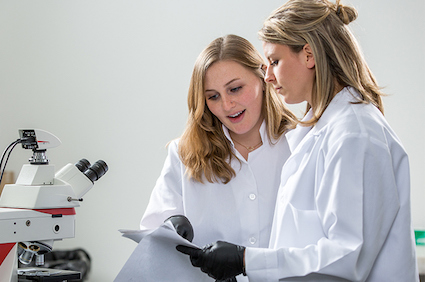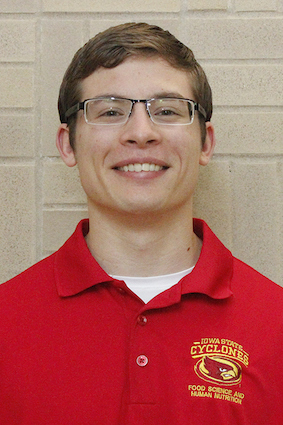Human scientists among undergraduates to present research at national conference
03/26/2018

Jenna Petersen is one of two College of Human Sciences students who will attend the National Conference on Undergraduate Research in Oklahoma. Petersen’s research examined the effectiveness of motivational interviewing. Photo by Ryan Riley.
With four years of undergraduate research under her belt and a passion for helping people to adopt healthier behaviors, Iowa State University kinesiology and health student Jenna Petersen will share her research on a national platform next week.
“A lot of the diseases in our country today have to do with people not choosing to do everyday health behaviors,” said Petersen, who is one of Iowa State’s first peer wellness educators with ISU Student Wellness. “Doctors often don’t have enough time to help people make lifestyle changes, so that’s where health coaches come in. I’m really excited to share health coaching with more people.”
Petersen is one of two undergraduates from the College of Human Sciences and 51 from Iowa State who will present their research at the National Conference on Undergraduate Research (NCUR 2018), April 4 to 7 at the University of Central Oklahoma. Iowa State’s research was chosen from more than 4,000 abstracts submitted for the conference.
“In the College of Human Sciences, we strive to provide high-impact educational opportunities for our students,” said Brenda Lohman, associate dean for research and graduate education. “Undergraduate research is an important way for students to connect key concepts and information they learn in the classroom with systematic investigation and research. We are very proud that two of our students will be able to present their research on a national stage.”
Increasing physical activity, reducing stress
Health coaching is a relatively new area, focusing on prevention and changing everyday health behaviors. Iowa State in 2015 began offering an undergraduate health coach certificate that provides a background in nutrition, exercise, and psychology for any student interested in becoming a health coach.
Petersen’s research, called “Effectiveness of Motivational Interviewing for Different Personalities in College Students,” examined outcomes for 45 students who received health coaching.
Preliminary findings of the study show that health coaching is beneficial for both introverts and extroverts in increasing physical activity, decreasing stress, and increasing self-efficacy or belief in succeeding. Results indicate that there may be slightly more benefit for introverts, who would not typically use motivational interviewing as a strategy for improving their health and wellness.
“When extroverts make plans, they might sometimes overbook themselves, not recognizing their limitations,” Petersen said. “Sometimes, introverts are a little more in tune with that introspective piece of self-efficacy.’”
Research on childhood obesity
Benjamin Dralle, a senior in nutritional science and genetics, will present “Childhood Obesity Treatment in Iowa: Primary Care Providers’ and Residents’ Practices and Attitudes” at the national conference. His research focuses on how primary care providers in Iowa view the assessment and treatment of children with obesity.
“Our results indicate that primary care providers in Iowa are providing guidance on weight-related behaviors for children (such as guidance on diet/nutrition and/or physical activity),” Dralle said. “However, medical residents — who are primary care providers in training — are failing to do the same in their own practice. Our survey respondents identified a lack of time, low levels of patient interest, and inadequate referral services as barriers to childhood obesity-related care in the state of Iowa.”
Dralle worked with Lorraine Lanningham-Foster, an associate professor in food science and human nutrition, doctoral student Maren Wolff, and a pediatrician and health coach at Blank Children’s Hospital on his research. He will not only showcase his research at this conference, but also at Posters on the Hill, a competitive event on April 17 and 18 that will give 60 undergraduate students an opportunity to showcase their research with members of Congress in Washington, D.C.
Undergraduate research opportunities
Several other opportunities exist for Iowa State undergraduates wanting to get involved in research. The Louise Rosenfeld Undergraduate Research Internship in the College of Human Sciences provides a paid opportunity for undergraduates to participate in research, work with prestigious faculty, prepare for graduate school, and gain invaluable experience for their future careers. Applications will be accepted through April 15 for these paid internships for summer or fall.
 “The goal of the Rosenfeld Undergraduate Research Internship is to involve students across all of our majors in CHS and give them the opportunity to explore cutting-edge research that improves the lives of Iowans and beyond,” Lohman said. “The sense of excitement the students convey in this story is what many of our Rosenfeld Interns feel after completing their internship. I encourage students to apply to our upcoming deadline for summer and fall internships.”
“The goal of the Rosenfeld Undergraduate Research Internship is to involve students across all of our majors in CHS and give them the opportunity to explore cutting-edge research that improves the lives of Iowans and beyond,” Lohman said. “The sense of excitement the students convey in this story is what many of our Rosenfeld Interns feel after completing their internship. I encourage students to apply to our upcoming deadline for summer and fall internships.”
Research in the Capitol, featuring undergraduate research from Iowa’s three Regent universities, will be held April 3 at the state capitol. And Iowa State’s Symposium on Undergraduate Research and Creative Expression will on April 10 provide undergraduates from all academic disciplines with an opportunity to share their research with the university community and other guests through conference-style oral presentations.
Honors program encourages research
The University Honors Program gave both Dralle and Petersen many opportunities to be involved in undergraduate research at Iowa State.
“I started research with Dr. Lanningham-Foster through the First-Year Honors Mentor Program,” Dralle said. “I branched out a little bit into other research areas over the next several years, including a summer internship in lung cancer research at the University of Minnesota, before returning to work with Dr. Lanningham-Foster through the Cyclone Scholars Summer Research Experience this past summer. I then continued this work through a Rosenfeld internship in the fall of 2017, during which I helped to present this research at a national conference in late October.”
Petersen’s journey with research included working with kinesiology associate professor Jason Gillette on biomechanics as a freshman. Then as a sophomore, she worked with professor Warren Franke, who has a long-term partnership to reduce cardiovascular disease among Iowa Department of Public Safety law enforcement officers. Today, Petersen works in the Physical Activity and Health Promotion Laboratory under the guidance of Greg Welk, a Barbara E. Forker Professor in Kinesiology, and doctoral student Katy Southard. Her mentors have taught her proper techniques relating to data and statistical analysis.
“I am really glad I got involved with research,” Petersen said. “I even took a 500-level kinesiology course from professor Panteleimon Ekkekakis on research methods in kinesiology. That gave me a great foundation for finishing up this project. In my major, I was required to take an entry-level statistics course, but it was nothing quite as applicable to really being able to read, understand, and discern whether or not a research article is legitimate.”
Fundraising to attend national conference
Students selected for the National Conference on Undergraduate Research will not only present their research to students, faculty, and staff from universities and colleges around the nation, but will also have the opportunity to attend special events and lectures, meet professionals in their fields, explore graduate school and career options through the Professional Preparation and Graduate School Fair, and more.
Participants must each pay about $500 to cover their travel, food, hotel, and registration expenses for the conference. Petersen and other students launched a crowdfunding campaign through FundISU to raise $17,000 to cover those costs. The campaign ends Friday, March 30. Those wishing to help the students attend the National Conference on Undergraduate Research can contribute at: https://fundisu.foundation.iastate.edu/project/9320.
Key contacts
Jenna Petersen, senior in kinesiology and health, Iowa State University, jlynnp@iastate.edu
Benjamin Dralle, senior in nutritional science, Iowa State University, btdralle@iastate.edu
Svitlana Zbarska, program coordinator, Undergraduate Research Program, Iowa State University, 515-294-4371, szbar@iastate.edu
Chelsea Davis, communications specialist, ISU News Service, Iowa State University, 515-294-4778, chelsead@iastate.edu
Lynn Meadows, communications specialist, College of Human Sciences, Iowa State University, 515-294-3689, lynnm@iastate.edu
